Image
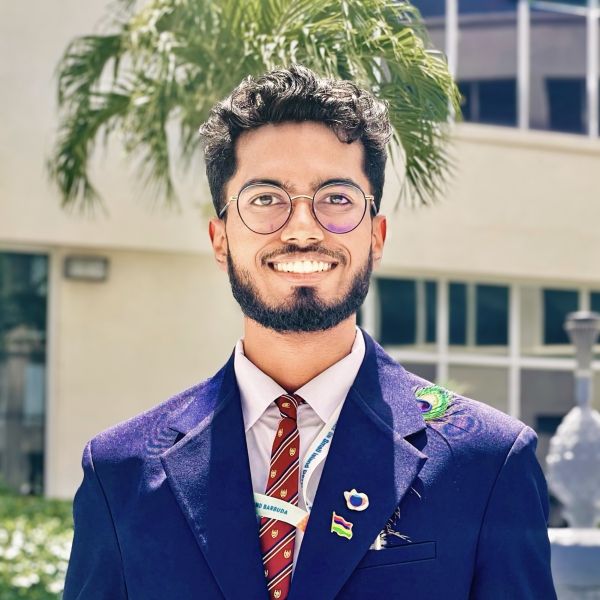
-
Krishna Pentayah
Founder and CEO of Sov Lanatir, Science Diplomat, Engineer, Artist, and Author
- 30 Under 30
- 2025
Krishna is a young polymath, engineer and the Founder of Sov Lanatir: Mauritius' leading youth-led environmental NGO committed to amplifying voices of African countries and Big Ocean States for climate justice.
Mauritius, Age 27
How are you using education to build more sustainable and equitable communities? Tell us about your EE work and impact.
Education, to me, is not only about knowledge transfer; it is about awakening a sense of belonging to our Mother Earth. Through our NGO Sov Lanatir, we use holistic education as a bridge between science, culture, and compassion, helping young people see sustainability as both an environmental and human responsibility.
We design interdisciplinary climate education programmes that merge engineering, ecology, Indigenous knowledge, and the arts. Our “Lekol dan Lanatir” (School in Nature) workshops teach students how traditional stories, languages, and rituals carry ecological wisdom. We also conduct hands-on learning and work alongside fisherfolk through mangrove regeneration and endemic forest restoration, where participants learn the science behind ecosystems while experiencing their sacredness.
So far, over 6,000 students across Mauritius have been trained through these educational initiatives, leading to tangible restoration outcomes and youth-led micro-projects in their villages. By uniting creativity with critical thinking, our model fosters a generation of leaders who understand that sustainability is not just technical; it is cultural, emotional, and deeply human.
Tell us about your journey to where you are today. What inspired you? What has your path been like?
I was born in Écroignard, a small village in Mauritius, where mountains, forests, and the sea form a living university. My early fascination with Nature’s balance--and the spiritual traditions that honour Her--shaped my worldview long before I studied engineering. I grew up observing both the beauty of our ecosystems and the fragility of our communities in the face of environmental decline.
As I pursued Mechanical Engineering, I became determined to merge scientific precision with humanity and compassion. My research on biomimicry in wind turbine aerodynamics explored how a Humpback Whale from Nature can inspire sustainable technology. I also worked on the design of a canine front limb prosthesis for my fellow 3-legged friend, earning recognition through the Institution of Mechanical Engineers’ competition. I am currently doing research at the University of Mauritius on Hydrogen renewables.
Alongside this, I authored Langaz Liniver, part of the first scientific anthology in Mauritian Creole, using language as a tool of environmental education and decolonisation. I deeply believe that languages fashion the way we foster our relationship with the Natural world.
At nineteen, I founded Sov Lanatir, a youth-led NGO engaging over 60,000 young people in restoration and cultural preservation. The Wakashio oil spill was a turning point for us; transforming our grief into collective action through community-based mangrove regeneration and climate education.
My journey has since carried me to global platforms such as the United Nations, African Union, and SIDS4 International Conference, where I advocate for the Global South’s voice in climate diplomacy by connecting worlds: science and art, technology and spirituality, tradition and innovation. Each initiative I lead is grounded in the conviction that true sustainability is both ecological and moral: we cannot restore our planet without restoring our sense of kinship with it.
How can people learn more about or support your work?
You can learn more and support us through the social media page of Sov Lanatir.
You can also find me on Facebook, Instagram, and LinkedIn.
A Little More About Me
What book, film, or art piece has had the greatest impact on you?
One of the first books I read as a child was Le Petit Prince. The line that never left me is: “C’est le temps que tu as perdu pour ta rose qui fait ta rose si importante.”It reminded me that what makes something truly valuable is the time, love, and care we give to it. But beyond that, the book taught me something even deeper; to remain a child at heart. To keep that sense of wonder, curiosity, and tenderness toward the world, even as we grow and face its complexities.
In a world that often rewards speed and certainty, Le Petit Prince taught me the quiet strength of innocence; to see with the heart, to care without calculation, and to never stop believing that small acts of love can change everything.
Where do you feel most at peace and why?
Three places: In Nature, in theatres, and in books. I will quote one of my favourite artists, van Gogh: "I have Nature and art and poetry, and if that is not enough, what is enough?"I deeply believe that real peace can only reach one from one's inner landscapes. It starts from within, then blooms without. Know what to feed the "within" and the "without" shall—like a garden of sunflowers—beautifully grow.
What’s a passion project of yours outside of your work?
I'm currently working on a book about decolonising our inner landscapes: our imagination, our languages, the way we view beauty, our relationship with one's own self, with the other and with Nature...Did you know that even the way we see beauty, in people, communities, and the natural world, is often still colonised?Along with poetry, I also love to make Art through paintings; in search of my Truth.
What song or artist has uplifted you lately?
A Buddhist friend of mine shared me this chant when I was going through a difficult time: "Namo’valokiteshvaraya (The Great Compassion) Chant" by Buddhist monks from the Plum Village. This chant provides an opportunity to get in touch with the seed of compassion in our hearts, to invite it to manifest and heal or accept our inner and outer world.
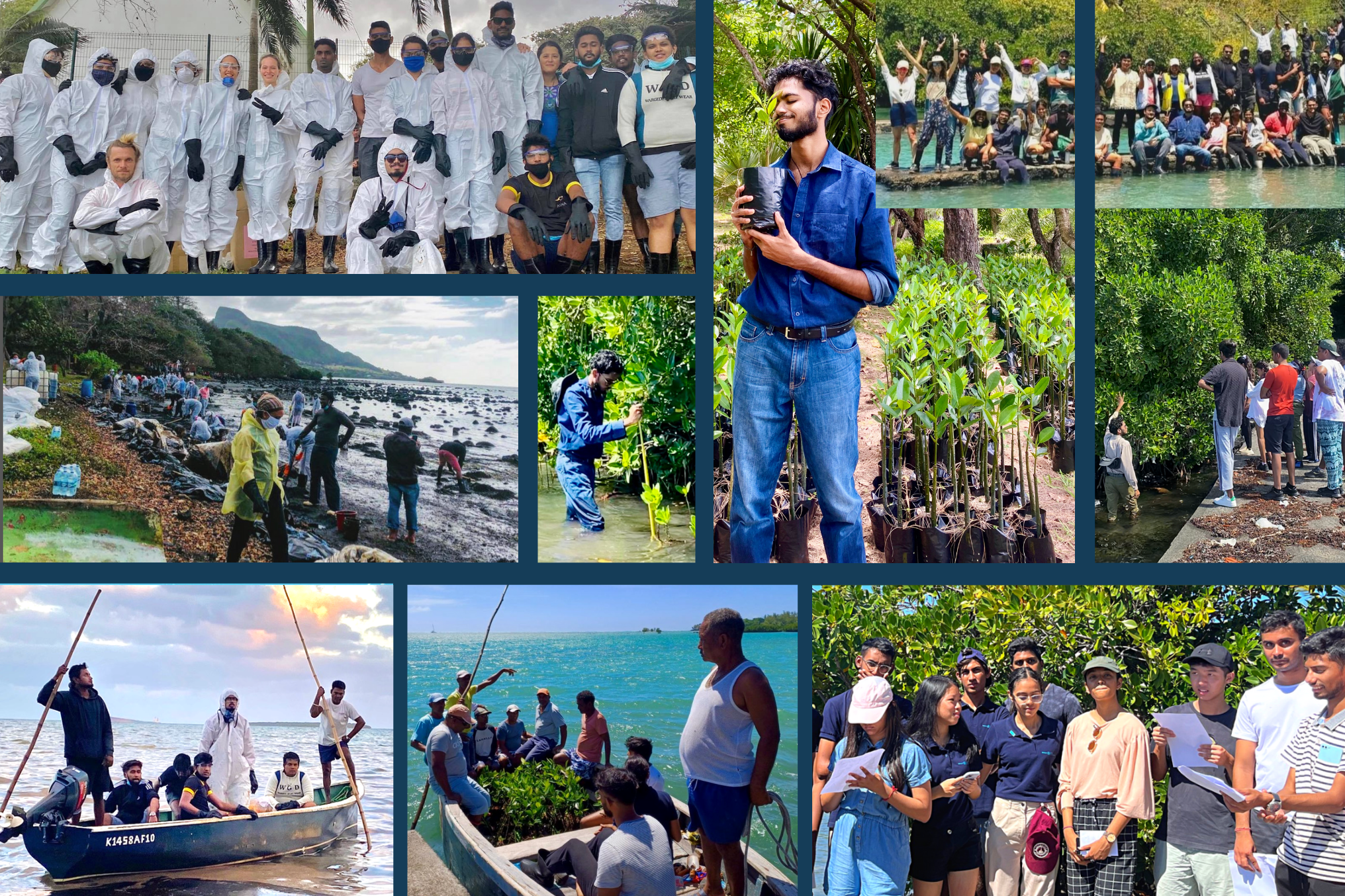
Oil spill and post-oil spill multi-disciplinary mangrove regeneration with Sov Lanatir: working with fisherfolks and providing climate-education for students. Photo credit: Sov Lanatir
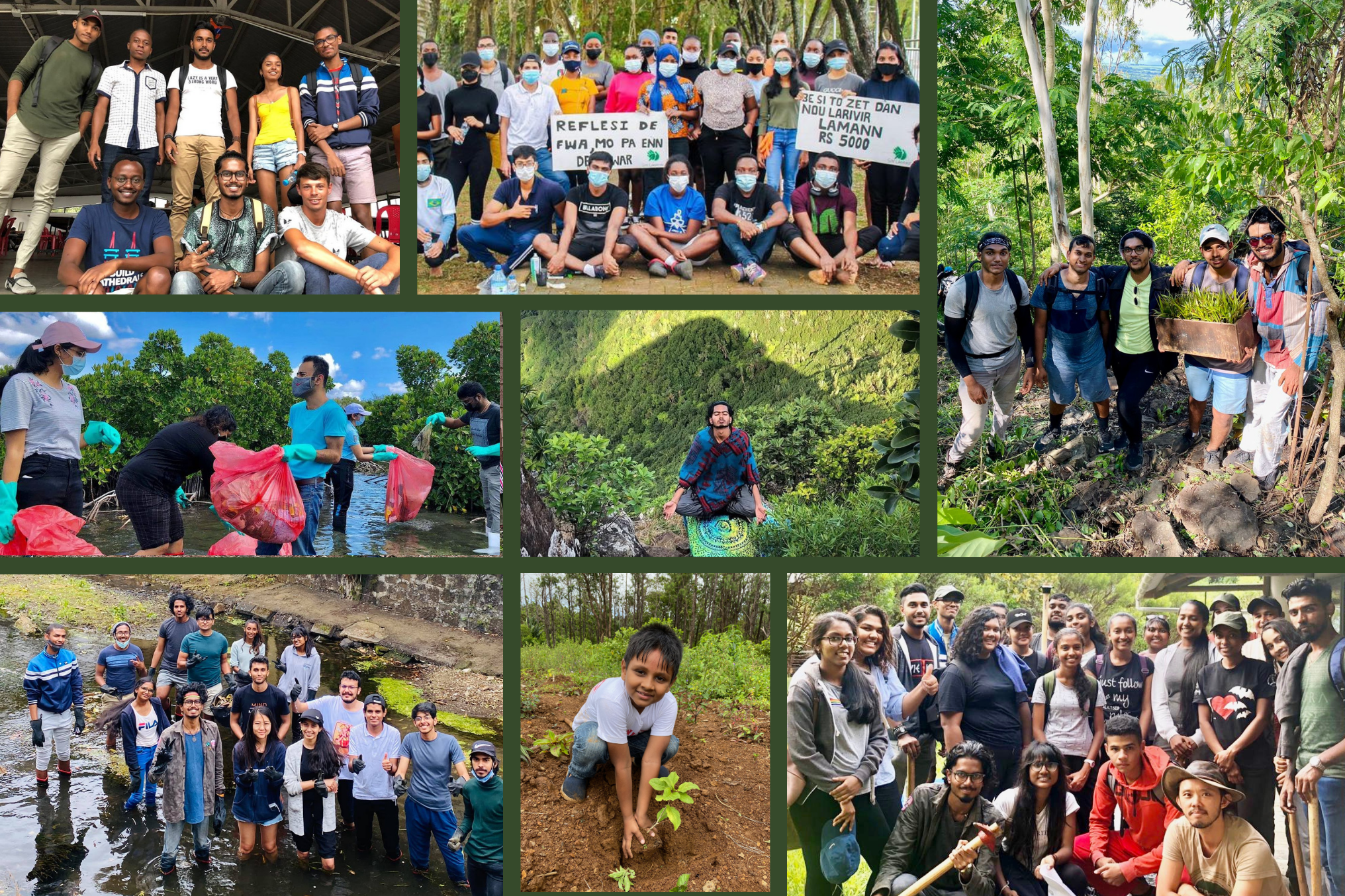
Sov Lanatir doing nation-wide clean-up sensitizations and endemic forest restoration with various eco-sensible partners. Photo credit: Sov Lanatir

Krishna fostering his village-originated ecocentric values through various cultural- and scientific-diplomacy events at various countries, including international bodies like the African Union and the United Nations. Photo credit: Krishna Pentayah
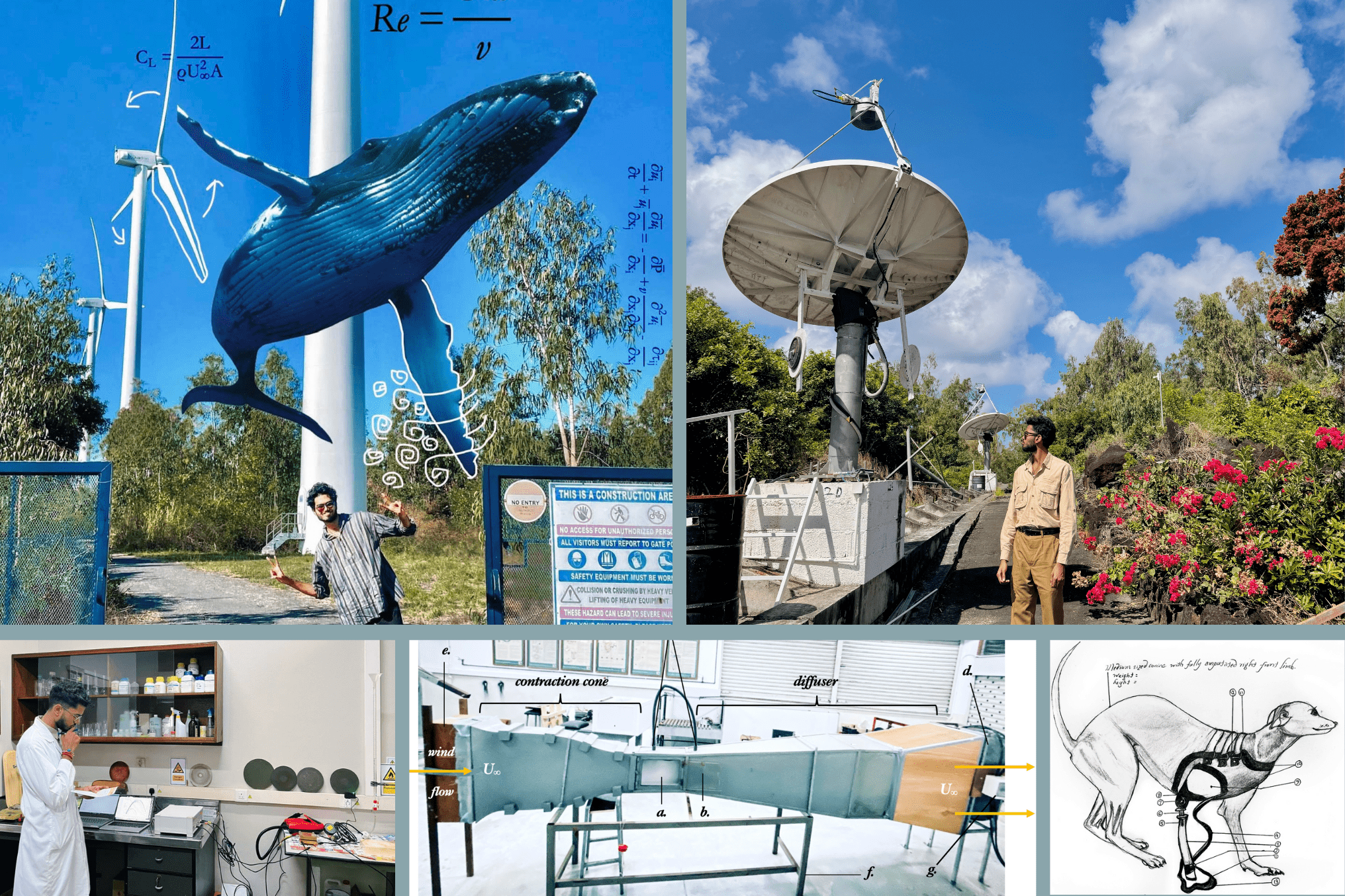
Krishna's various engineering and research-based projects, including the biomimicry of Humpback whale tubercles for energy efficiency, the canine front limb prosthesis, and the structural optimizations of telescopes. Photo credit: Krishna Pentayah
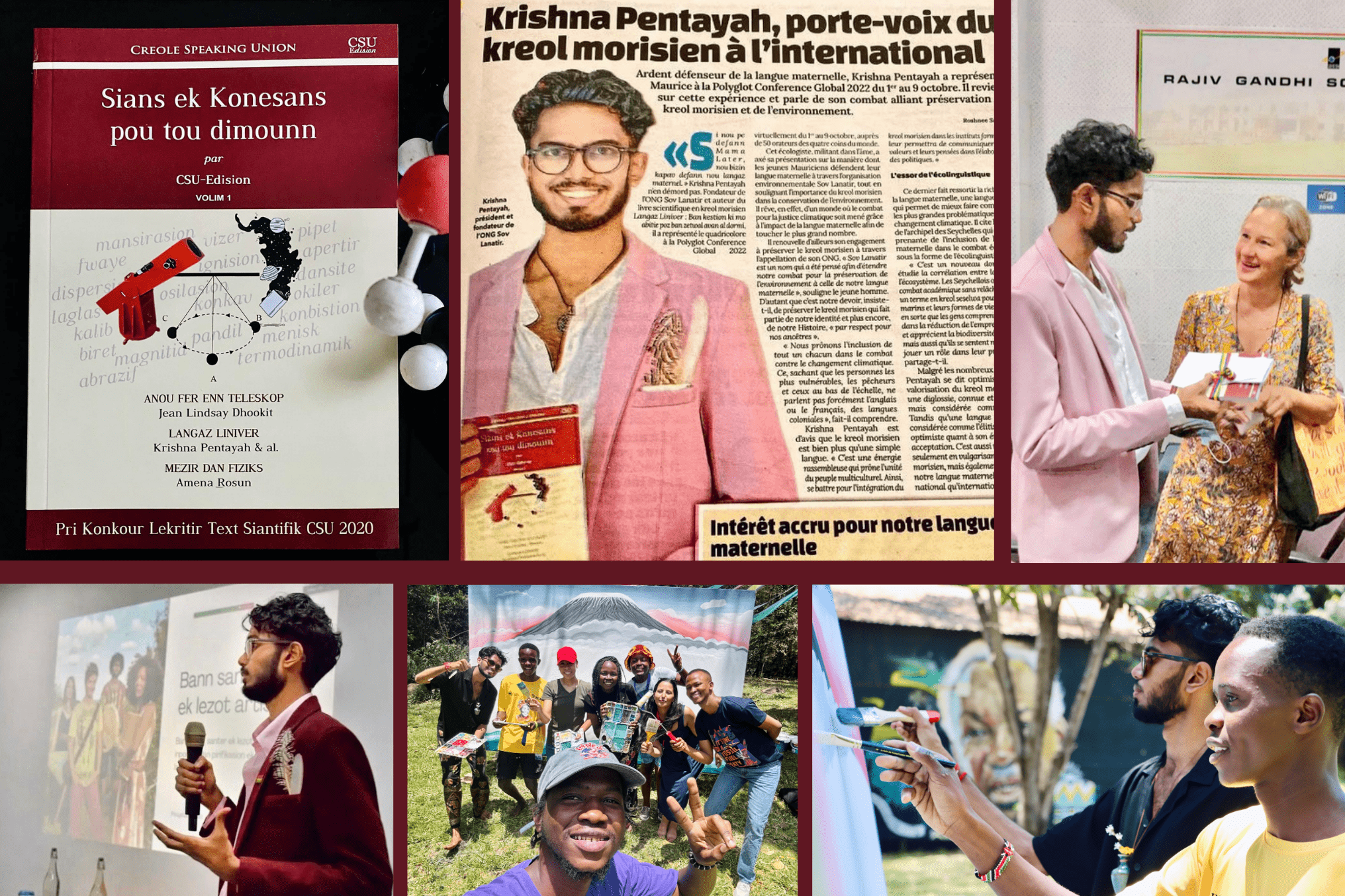
Krishna's award winning book: Langaz Liniver from the very first Scientific Anthology in his Mother Tongue: the Mauritian Creole language. His works as an artist are also depicted alongside his world-family. Photo credit: Krishna Pentayah